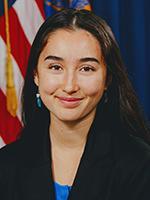
Student Profiles

1 Search Results

Lauren Wedekind
NIH Oxford Scholar
B.A. Human Biology, Stanford University, 2016
MSc Public Health, London School of Hygiene & Tropical Medicine, 2017
Dr. Robert Hanson (NIDDK),
Prof. Mark McCarthy (Oxford)
and Prof. Anubha Mahajan (Oxford)
Genetics & epigenetics, Genomics, Cardiometabolic health
Lauren's high school research on gestational diabetes with mentor Dr. Louiza Belkacemi sparked her enduring interest in the global epidemic of cardiometabolic diseases. Especially committed to deepening understandings of diabetes across diverse populations, she has co-authored articles on gene expression, genetic associations and health outcomes, and served in community health advocacy. Upon Lauren's graduation in 2016, Stanford recognized her with the Deans' Award for Academic Achievement and John W. Lyons Award for Service, for her contributions to the university and broader communities.
During her public health training, Lauren orchestrated a jointly-mentored thesis investigating gene-environment interactions in a 200,000-person cohort within UK Biobank, with respect to diabetes status. She planned and executed the study with the mentorship of London-based health equity researcher Dr. Rohini Mathur, and Oxford-based diabetes genetics and genomics researchers Dr. Anubha Mahajan and Professor Mark McCarthy. Lauren then worked as an Intramural Research Trainee with Dr. Robert Hanson at the Phoenix Indian Medical Center-based NIDDK Branch, investigating genetic associations with physiological traits in Southwestern Native American patients. She is grateful to continue her diabetes research with a team of mentors also dedicated to the interface of genetics, epigenetics, genomics and population health.
These learning opportunities--motivated by longtime interests in cardiometabolic health and science communication--have deepened Lauren's commitment to promoting bench-to-bedside medicine across diverse populations. In the coming years, she looks forward to investigating how genetic and environmental diversity jointly influence cardiometabolic disease etiology, to ultimately shape prevention and treatment strategies.


